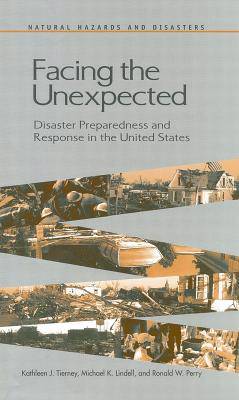
- Afhalen na 1 uur in een winkel met voorraad
- Gratis thuislevering in België vanaf € 30
- Ruim aanbod met 7 miljoen producten
- Afhalen na 1 uur in een winkel met voorraad
- Gratis thuislevering in België vanaf € 30
- Ruim aanbod met 7 miljoen producten
Zoeken
Facing the Unexpected
Disaster Preparedness and Response in the United States
€ 68,45
+ 136 punten
Omschrijving
Facing the Unexpected presents the wealth of information derived from disasters around the world over the past 25 years. The authors explore how these findings can improve disaster programs, identify remaining research needs, and discuss disaster within the broader context of sustainable development.
How do different people think about disaster? Are we more likely to panic or to respond with altruism? Why are 110 people killed in a Valujet crash considered disaster victims while the 50,000 killed annually in traffic accidents in the U.S. are not? At the crossroads of social, cultural, and economic factors, this book examines these and other compelling questions.
The authors review the influences that shape the U.S. governmental system for disaster planning and response, the effectiveness of local emergency agencies, and the level of professionalism in the field. They also compare technological versus natural disaster and examine the impact of technology on disaster programs.
How do different people think about disaster? Are we more likely to panic or to respond with altruism? Why are 110 people killed in a Valujet crash considered disaster victims while the 50,000 killed annually in traffic accidents in the U.S. are not? At the crossroads of social, cultural, and economic factors, this book examines these and other compelling questions.
The authors review the influences that shape the U.S. governmental system for disaster planning and response, the effectiveness of local emergency agencies, and the level of professionalism in the field. They also compare technological versus natural disaster and examine the impact of technology on disaster programs.
Specificaties
Betrokkenen
- Uitgeverij:
Inhoud
- Aantal bladzijden:
- 320
- Taal:
- Engels
- Reeks:
Eigenschappen
- Productcode (EAN):
- 9780309186896
- Verschijningsdatum:
- 6/12/2001
- Uitvoering:
- Paperback
- Formaat:
- Trade paperback (VS)
- Afmetingen:
- 152 mm x 226 mm
- Gewicht:
- 521 g

Alleen bij Standaard Boekhandel
+ 136 punten op je klantenkaart van Standaard Boekhandel
Beoordelingen
We publiceren alleen reviews die voldoen aan de voorwaarden voor reviews. Bekijk onze voorwaarden voor reviews.










